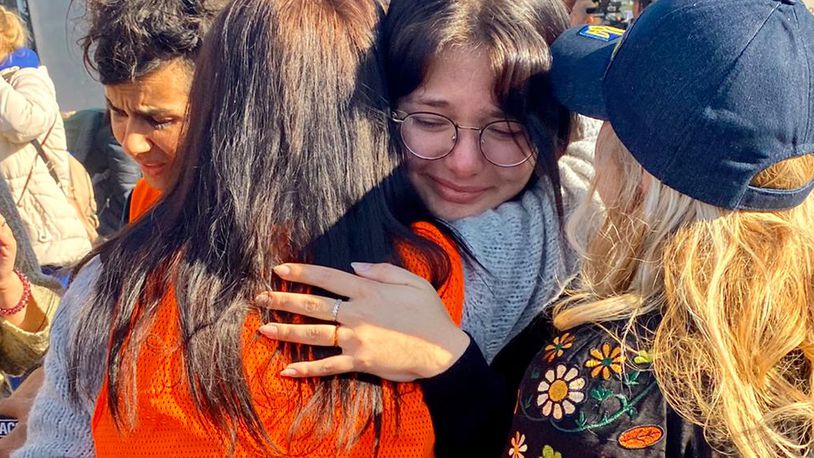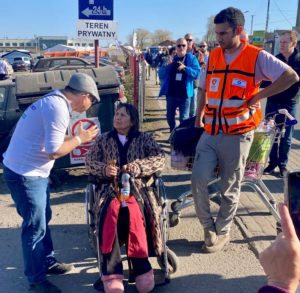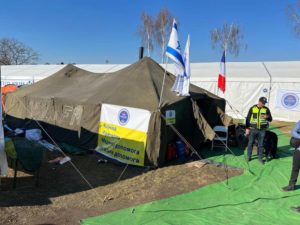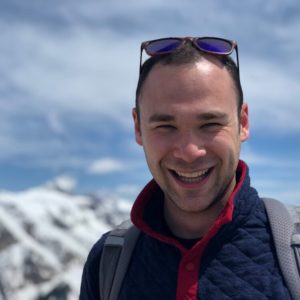
After Russian shelling intensified last month and a rocket exploded close to the Zhytomyr home of Nina, 76, she fled for Ukraine’s Polish border. When she arrived several days later after a long trip by car with other Zhytomyr residents, Nina was experiencing severe back pain.
She was directed to the Przemyśl Humanitarian Aid Center, a repurposed shopping mall near the Medyka border crossing in southeastern Poland, where doctors from Jerusalem’s Hadassah Medical Organization, one of Israel’s leading hospitals, have been running the medical clinic since March. There, she received treatment by doctors and Russian- and Ukrainian-speaking nurses who had volunteered to go to Poland as part of Hadassah’s ongoing Ukraine relief effort.
Nina was far from alone.
At what felt like the last possible minute, Elena escaped Kharkiv, Ukraine, with her 13-year-old twins and her autistic 15-year-old son, Daniel, who cannot speak. Janna, 77, who ran from the devastated Ukrainian port city of Mariupol, contracted a severe case of pneumonia during her three-day road trip to Lviv. When Lviv itself came under air attack, the main hospital there discharged Janna and evacuated her to Poland.
All these refugees ended up at Hadassah’s clinic.
“My grandfather’s cousin perished in Bialystok, not far away from where we were,” Rivka Brooks, director of pediatrics at Hadassah’s Mount Scopus campus in Jerusalem, said in an interview from Poland. “Imagine seeing the same Polish scenery and women standing with one suitcase 80 years after the Holocaust, when no one was there for us. You can’t not feel emotional about it.”
Brooks, 52, is among dozens of Hadassah doctors and nurses — both Jews and Arabs — who have volunteered over the last two and a half months for the humanitarian mission, a collaboration among the Hadassah Medical Organization, which operates two hospitals in Jerusalem; the New York-based Hadassah, The Women’s Zionist Organization of America, which is funding the effort; and Hadassah International, the organization’s global fundraising arm.
Dr. Yoram Weiss, acting director-general of the Jerusalem medical center and the person who designed and oversees the Ukraine program, said Hadassah began sending medical teams to the Polish border in early March. Now on its 10th mission, Hadassah already has treated more than 10,000 refugees and plans to maintain its presence in Poland at least through early June.
In addition to running the medical clinic at the Przemyśl refugee center, Hadassah doctors and nurses are treating children at a second refugee center in nearby Korczowa, Poland, and, in partnership with Médecins Sans Frontières (Doctors Without Borders), triaging trauma patients at the border. In addition, Hadassah sent trauma experts to train their Polish counterparts at the Medical University of Lublin, a regional trauma center about 125 miles to the north, in how to handle major traumatic injuries and mass casualty situations.
“Unlike other organizations, our physicians do not come independently, but as a group — four physicians, including two pediatricians, four nurses and an administrator,” Weiss said. “All are volunteers, and sometimes we have more people who want to go than we can accommodate.”
David “Dush” Barashi, Hadassah’s head medical clown, has been one of the medical center’s volunteers, putting sick and often anxious children at ease with his pranks and silliness. It was Dush who noticed a fragile 8-year-old boy and gently convinced him and his mother to come to the clinic, where the boy received a thorough check-up.
“The amount of respect we have gained with the WHO [World Health Organization], Médecins Sans Frontières and the Polish Red Cross is really amazing,” Weiss said. “They look at Hadassah and our impact on treating refugees, and they see us as an example of how things should have been done.”
The Jewish Federations of North America (JFNA) has been supportive. JFNA president Eric Fingerhut visited the Hadassah border clinic and JFNA has given Hadassah two grants to support the humanitarian mission.








